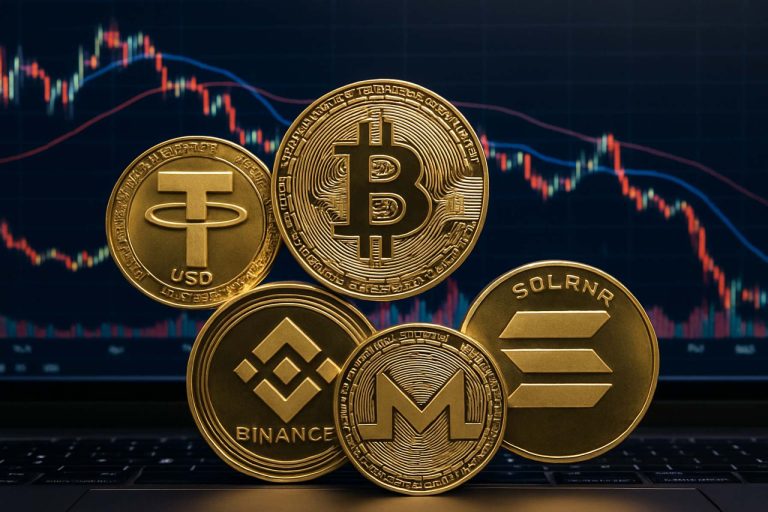
- Cryptocurrency’s influence on politics is growing, exemplified by a high-profile, exclusive gala where crypto leaders sought access and leverage with U.S. policymakers.
- Transparency and ethical concerns are mounting as policy discussions increasingly mingle with personal and financial interests in both public and private forums.
- Key officials, such as House Speaker Mike Johnson, have faced criticism for evasiveness and lack of oversight over high-stakes political events and major foreign gifts.
- The volatile nature of crypto markets—amplified by celebrity and political associations—poses heightened risks for investors and draws scrutiny from federal regulators.
- Bipartisan accountability and stronger regulatory oversight are essential as technology blurs the boundaries between profit, policy, and public trust in American democracy.
Dense, humid air hangs like a velvet curtain over Donald Trump’s Sterling, Virginia golf club, broken only by the sparkling laughter and clinking glasses of 220 guests—each a kingmaker in the turbulent world of cryptocurrency. The gala’s exclusive invitation, rumored to cost $148 million in collective buy-ins, promises more than gourmet fare: it’s access, proximity, leverage, and a ticket to the heart of Washington’s swirling tensions between policy, power, and profit.
Political Transparency Faces the Blockchain Age
Cryptocurrency has long courted controversy for its potential to upend the established order—decentralized, unregulated, and as prone to wild speculation as wild headlines. When cryptocurrency meets the nation’s highest office, questions multiply. Guests at the so-called “$TRUMP” meme coin event included top investors, influencers, and blockchain CEOs eager for a private audience. Behind closed doors, discussions likely wandered from digital tokens to policy, regulation, and, perhaps, the very future of American financial oversight.
But as scrutiny mounted over the ethics of such an event—where policy and personal gain swirl dangerously close—one figure remained conspicuously out of the loop: House Speaker Mike Johnson. Pressed on the matter during a nationally broadcast interview, Johnson brushed aside questions. He painted himself as too consumed by legislative agendas to keep tabs on the president’s private dealings—an evasive move now earning him quiet criticism from both sides of the aisle.
Busy Leaders and Blind Spots
Johnson’s avoidance isn’t a one-off. Only weeks earlier, when pressed about a $400 million Boeing 747 jet donated to the U.S. by the Qatari government, Johnson deflected again. His repeated claims of distraction—often citing his “big, beautiful bill”—have not gone unnoticed by ethics watchdogs or voters.
The gifting of the jet revived debates around the Emoluments Clause of the U.S. Constitution, which forbids presidents from accepting gifts from foreign powers without congressional oversight—a safeguard against foreign influence. The details of the jet’s intended use and the full extent of the Qatari gesture remain shrouded, intensifying concerns from transparency advocates.
The Price of Access
If the crypto gala was a marker of new forms of influence, its immediate result was hardly reassuring to investors: the $TRUMP token tumbled 16% the next day, dispelling any illusion of a Midas touch from high-profile handshakes. Market volatility is part of crypto’s DNA, but savvy investors know that volatility triggered by political spectacle can be especially risky—and a flashing warning sign to regulators.
America’s largest agencies, including the Securities and Exchange Commission, have previously cautioned about “pump and dump” schemes and the hazards of celebrity-driven crypto pushes. Congress has debated new, stricter guidelines for political and financial entanglements in this sphere—a conversation only amplified by the sudden mingling of campaign-style events and wild-west financial innovations.
A Democratic Double Standard?
Observers have long wondered if reactions would differ were the tables turned. History shows that both major parties bristle at allegations of impropriety when their rivals are in the spotlight. Yet, the principle of accountability—regardless of party—should remain non-partisan. Bi-partisan government watchdogs, including those at the White House, stress that trust and transparency demand equal scrutiny and clear ethical boundaries for all elected leaders.
The Takeaway
The convergence of crypto’s seductive promise and high-octane national politics demands more than dismissive sound bites. As technology blurs the lines between power, profit, and policy, American democracy must rise to the challenge of sharper oversight, greater transparency, and unwavering ethical standards.
In a world where the clout of a meme coin can purchase proximity to the presidency—and where the meaning of “busy” can sound suspiciously like “uninformed”—the public’s vigilance is no longer optional; it’s essential.
Crypto, Influence & Politics: What the $148M Trump Gala Reveals (and What You Need to Know Now)
Beyond the Gala: Untold Facts about Crypto, Power, and Political Transparency
The recent $148 million crypto gala at Donald Trump’s Sterling, Virginia, golf club isn’t just headline material—it exposes high-stakes intersections between digital finance and U.S. political influence. Here’s what the original article didn’t fully explore, presented with real-world context, market outlooks, and actionable insights for savvy readers.
—
1. How Cryptocurrency Is Changing the Political Game
Unprecedented Political Donations:
For the first time in U.S. history, political figures openly accept donations in crypto, raising regulatory questions. In the 2024 campaign cycle, several candidates began accepting Bitcoin and Ethereum, making election-finance transparency more challenging.
Blockchain’s ‘Dark Money’ Threat:
While blockchain is technically transparent, the anonymity of wallets can mask donor identity. This loophole is flagged in bipartisan Congressional discussions (source: FEC) for its potential to eclipse traditional campaign watchdogs.
How-To: Can You Use Crypto in Politics?
– Check Legality: Not all states allow crypto political contributions.
– Get a Receipt: Always receive digital confirmation from the official campaign wallet.
– Mind the Limits: Contribution limits still apply per FEC rules, regardless of currency.
—
2. Specs, Features & Market Analysis of Meme Coins Like $TRUMP
Real-World Risks:
Meme coins—digital tokens inspired by jokes, events, or celebrities—are notorious for wild price swings and limited real-world use. $TRUMP’s 16% dive post-gala reflects their inherent volatility and speculative nature.
Features & Specs:
– Technological Base: Most meme coins run on existing blockchains (usually Ethereum or Binance Smart Chain)
– Tokenomics: Often have high total supply with small per-token price
– Use Cases: Primarily speculative trading; rarely used for purchasing goods/services
Security & Scams:
Research by Chainalysis shows meme coins are more susceptible to rug pulls and pump-and-dump schemes than established cryptocurrencies. Always use reputable exchanges and wallets.
Related Trend:
Mainstream tokens (Bitcoin, Ethereum) are increasingly distancing themselves from meme coins to boost institutional adoption and reduce reputational risk ([source: Chainalysis, 2024 Global Crypto Crime Report](https://www.chainalysis.com)).
—
3. Market Forecasts and Industry Trends
Regulatory Crackdown Incoming:
The SEC and CFTC are ramping up enforcement on celebrity-driven tokens. The Gary Gensler-led SEC has filed high-profile cases against celebrities for allegedly boosting tokens without disclosing compensation.
Crypto in Campaign Finance:
– Expected in 2024: New FEC rules for reporting crypto donations
– Industry Prediction: Greater demand for blockchain audit trails (source: Deloitte)
What’s Next:
Policy experts predict bipartisan support for stricter guidelines on political figures’ crypto connections by 2025.
—
4. Pros & Cons Overview
Pros:
– Potential for Innovation: Faster, borderless donations and fundraising.
– Public Ledger: Blockchain can be auditable—if IDs are known.
– Outreach to Younger Voters: Crypto is popular with millennials and Gen Z.
Cons:
– Anonymity Risks: Harder to track donor influence.
– High Volatility: Sudden value drops can undermine campaign budgets.
– Ethical Gray Zones: Proximity between crypto moguls and policymakers invites corruption allegations.
—
5. Most Pressing Reader Questions Answered
Q: Is it legal for politicians to accept cryptocurrency donations?
A: At the federal level, yes, but strict reporting and valuation rules apply ([FEC](https://www.fec.gov)). States set their own policies.
Q: Should I invest in meme coins like $TRUMP?
A: Exercise caution. Meme coins are extremely volatile and often driven by hype rather than fundamentals. Never invest more than you can afford to lose.
Q: What are the real dangers of crypto-politics overlap?
A: Risks include increased foreign influence, campaign finance loopholes, and regulatory blind spots.
—
6. Life Hacks & Quick Tips for Crypto Users in Politics
– Always Verify Campaign Wallets: Only send contributions to officially listed addresses.
– Use Blockchain Analytics: Tools like Etherscan can verify where your token went.
– Stay Informed: Follow updates from SEC and FEC on crypto regulations.
—
7. Controversies & Limitations
– Emoluments Clause Back in Spotlight: Foreign gifts (like the Qatari jet) can compromise U.S. political independence. The clause, rarely enforced, may become a legislative battleground.
– Political Double Standards: Outcry often depends on party affiliation, undermining bipartisan ethics.
—
8. Actionable Recommendations
– For Voters: Demand transparency—ask candidates to disclose crypto contributions.
– For Investors: Research meme coin fundamentals; don’t follow hype alone.
– For Lawmakers: Push for standardized, blockchain-based campaign finance reporting.
– For Crypto Users: Stick with reputable coins and platforms; beware of political pump-and-dump schemes.
—
Conclusion
The nexus of cryptocurrency and American politics is only growing stronger—and more complex. As gala invites and meme coins flash across social media, voters, investors, and policymakers must demand the kind of regulatory clarity and transparency essential for democratic trust.
Stay vigilant, stay informed, and let accountability—not hype—guide your crypto and political decisions.
Further reading:
– White House
– SEC
– FEC



